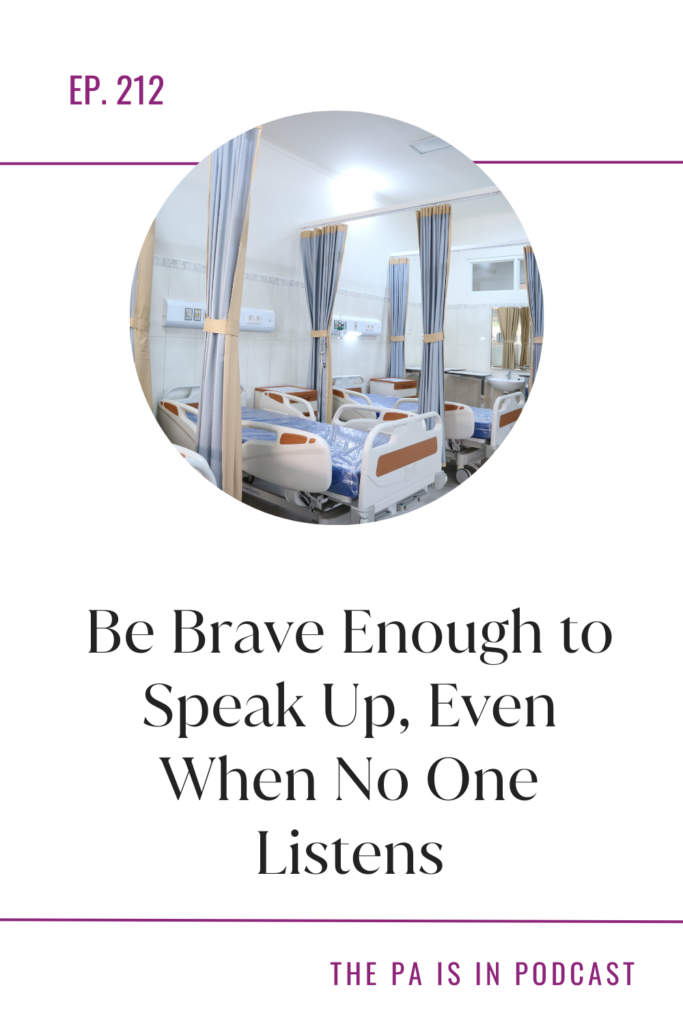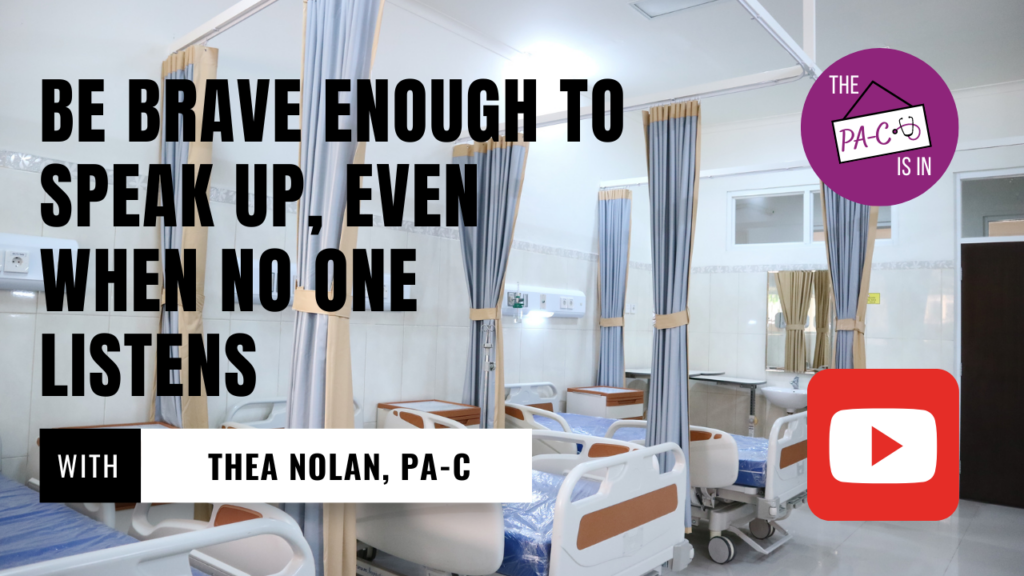
Be Brave Enough to Speak Up
Thea Nolan is an Interventional Radiology PA who was featured in the 2022 AAPA PA Week News Features for identifying a faulty medical device. Because of Thea’s reporting, the devices were recalled, saving the lives of and preventing complications in tens of thousands of patients. But this was no easy feat for Thea. Initially, no one would listen to her. Thea began to question herself, but knew she knew the truth and kept speaking up until she found someone who would listen. Eventually, she was recognized by the FDA. But this experience changed her view of healthcare. In today’s episode, we dive into Thea’s story.
Listen Here
APPLE PODCASTS | SPOTIFY | STITCHER
Watch on YouTube

What Does an IR PA Do?
Thea has been a PA since 2012 and has worked in IR since 2015. Thea describes it as the “coolest job ever.” Are you still looking for your unicorn job? Check out episode 199 to learn how to custom design your dream unicorn job.
As an IR PA, Thea performs vascular access procedures such as port placements, inserting PICC lines, and placing tunneled IJ lines. More recently, Thea started cross-training in body IR where she does percutaneous biopsies, CT-guided cyst drainages, and US-guided abscess drainages.
After graduating PA school. Thea knew she wanted to do something surgery-related. Her first job turned out not to be what she expected, but she describes it as a blessing in disguise. She learned how to do PICC lines with patients awake during the procedure. Because of her patients being awake and alert, Thea learned how to approach patients, as well as new technical skills.
After one year, Thea felt bored and like she was losing the medical aspect of what she learned in PA school. She moved into a cardiac surgery job, but quickly learned it was not the right fit for her. However, Thea was able to learn what she loved, which was doing procedures.
The Learning Curve
In IR, you touch every facet of medicine and every type of speciality. There is still a lot of medicine to practice as well as the surgical and technical procedures.
As a PA, specifically an IR PA, you need to learn how to be comfortable with being uncomfortable. There is a difference between being credentialed and being competent. Then there’s an even bigger difference with being confident. Thea’s initial supervising physician had high expectations, so she was able to be trained to a very high level. Thea now has high expectations when she trains new providers.
It takes years to get competent and comfortable with each procedure. There is always a learning curve. Confidence is an ever-moving target in medicine because the standard of care changes and new medical procedures and devices are continuously created.
The Malfunctioning Device
In early 2021, Thea had a patient present who had a question of a malfunctioning device. In checking the patient’s chart, Thea noticed a recent note that mentioned the patient’s blood was dilute and swirling when drawn from port. Thea immediately thought about contrast when reading the blood was swirling. Next, Thea looked at the patient’s last imaging study – a CT scan with contrast through her port. In the report, leakage was noted around the catheter.
Thea performed a dye study on the patient’s port, and it showed a small leak. She scheduled the patient for an IR appointment and during the procedure noticed that the reservoir in the port was blown out.
Thea kept the device to show her colleague who had placed the port. Her colleague had just been signed off on placing lines, and this port placement was one of her first independent procedures. Thea wanted to show her colleague it wasn’t her fault or any issue with her technique. Instead, it was the device that was faulty.
Shortly after that, another patient at a sister hospital had a similar-looking device removed. Because Thea had kept the device she removed, she was able to look up the lot number and compare it to the device from the sister hospital. The lot device numbers on both ports were the same. Soon, several more patients were coming in with malfunctioning devices.
No One Would Listen
Thea started reporting the multiple malfunctioning devices according to her hospital’s reporting protocols, but it was difficult to get anyone to listen to her, let alone do anything about it. Thea started questioning herself. She put in reports to risk management and to her immediate supervisor, but heard nothing back. She sent follow up emails and made follow up phone calls, but still did not receive any feedback.
After two weeks of no responses. Thea decided to call her department chair on a Friday evening. She told him that he needed to do something and that she wanted an answer that day. Her department chair went into action. This led to a nationwide recall of tens of thousands of ports from several different lots.
Losing Trust in the System
We as providers have inherent trust in the system. We trust that things are quality-controlled and safe and reliable. It’s shocking to us when we learn that’s not always true.
No one else seemed upset or worried about these faulty devices. Thea started doubting herself, but knew she was right and knew the right thing to do. She kept pushing and didn’t let it go. She didn’t want to sound the alarm unnecessarily, but she knew deep down something was wrong.
Keep Speaking Up
Things happen in certain institutions that might not be right, but are culturally accepted. But if something is keeping you up at night, you need to speak up and keep speaking up. Are we truly focused on patient care? Here is an example of how we’re not and why we need to change it. It can be upsetting when other providers don’t seem interested in providing the best, highest quality patient care.
We all have a voice and need to be brave enough to use it. Change will only happen if you advocate for yourself, your group, and your patients. The little victories will add up and move medicine forward.
If you see something that isn’t right, you need to speak up, even if your supervising physician seems ok with it. Even with the surgical hierarchy, we need to still say something.
Initially, Thea reported to her direct supervisor several times, but nothing happened. Eventually, she made the decision to go above his head and up to the department chair. It was uncomfortable to not follow the hierarchy she was accustomed to, but Thea knew it was the right thing to do.
Thea eventually called risk management for the third time and asked for permission to call her patients to notify them of the faulty ports. Risk management told her no. Thea said she wouldn’t accept that answer and that she needed to call her patients.
Thea is a rule follower and follows the classical hierarchy. She surprised herself with not following the rules and not listening to authority. But she knew that in this instance, the right thing to do was to keep speaking up and to notify her patients.
The Aftermath and Silent Awards
There was no retaliation from her institution for speaking out and being a whistleblower, but there was some retaliation from individual staff members. Some of Thea’s colleagues were angry that they were doing the work of removing and replacing ports, but Thea was getting the credit for identifying the problem. It also wasn’t lost on Thea that these patients needed to put forth extra effort and work to go through additional procedures when they were already undergoing difficult treatments.
One day, The came into work and saw plaques from the FDA recognizing her hospital as the hospital who identified the device issue and led to a Class Two Medical Device Recall. There was no note or anything about where they came from; they were just left on her desk. The hospital never made any announcement about the recall and their role in identifying the problem.
Six months after identifying the initial faulty port and initiating the recall, Thea received an email notifying her that she was nominated for the Josie King Hero Award with an invitation to attend a virtual meeting in three days. At the meeting, Thea learned she won the award. But again, there was no announcement or recognition from her hospital that Thea won this award.
A year later, Thea was featured by AAPA during PA Week. Thea describes this as the highlight of her career! But again, her hospital never talked about it or mentioned any of these awards.
Keeping Patient Safe
It shouldn’t be this hard to keep patients safe. As providers, we should truly want to practice evidence-based medicine. Thea followed her hospital protocols, but when the protocols failed, she intervened by taking the issue to her department chief. Her institution was grateful and supportive after the fact. But the process of getting there shouldn’t have been that difficult. Thea kept being told, “You can’t do that as the PA. It needs to be someone above you.” She responded with, “OK, who should I contact?” and was given the name of a person who no longer worked there. Thea kept running into significant barriers each time she advocated for her patients.
Instead of waiting for an incident or sentinel event to occur, these measures should be addressed at regular department meetings. We should ask who to call for different issues or how to address things that might come up. We should clarify the hospital policies and protocols before issues even happen. This way, if a policy doesn’t make sense or a person to notify is no longer working there, it can be addressed before an emergency occurs.
The Future of PAs
Through all of this, Thea learned that she loves process improvement. She says that it’s been an inspiring experience. Thea loves being a PA, but wants to have a wider reach. As PAs, we have the flexibility to help out in other areas that aren’t traditional PA roles.
PAs should be in C-suite roles, executive roles, creative design, process improvement, etc. Our clinical skills are not directly applicable to these positions, but our ability to communicate, problem solve, and think critically will all apply.
Thea helped to create a PA Leaders Task Force with the Massachusetts Academy of PAs. The task force is made of PAs who all practice in Massachusetts and are pioneers in their fields. They think outside the box and help push the PA profession forward.
It’s important to tune into and feed your curiosity. If you’re interested in process improvement but have never held that role before, be confident that you can figure it out. Listen to your curiosity and lean into new roles that seem interesting. Networking and making connections is so important in the PA profession. Check out this post on networking for more tips on how networking can help with your next career move. It’s also important to have mentors who motivate you and encourage you to be the best you can be. These mentors do not need to be in healthcare necessarily, but they do need to motivate and encourage you.
We all have a voice. Your voice matters. Speak up when you know something is wrong. Your voice is powerful and strong – use it to create real change.
Are you looking for someone to help you decide between two jobs or how to negotiate to create your unicorn job? Book a negotiation call with Tracy for specific concrete advice on your next steps. Are you looking for coaching support through a job transition, burnout or big life changes? Schedule a free 1-on-1 consult with Tracy to learn how she can help you understand your options and set up a coaching plan!